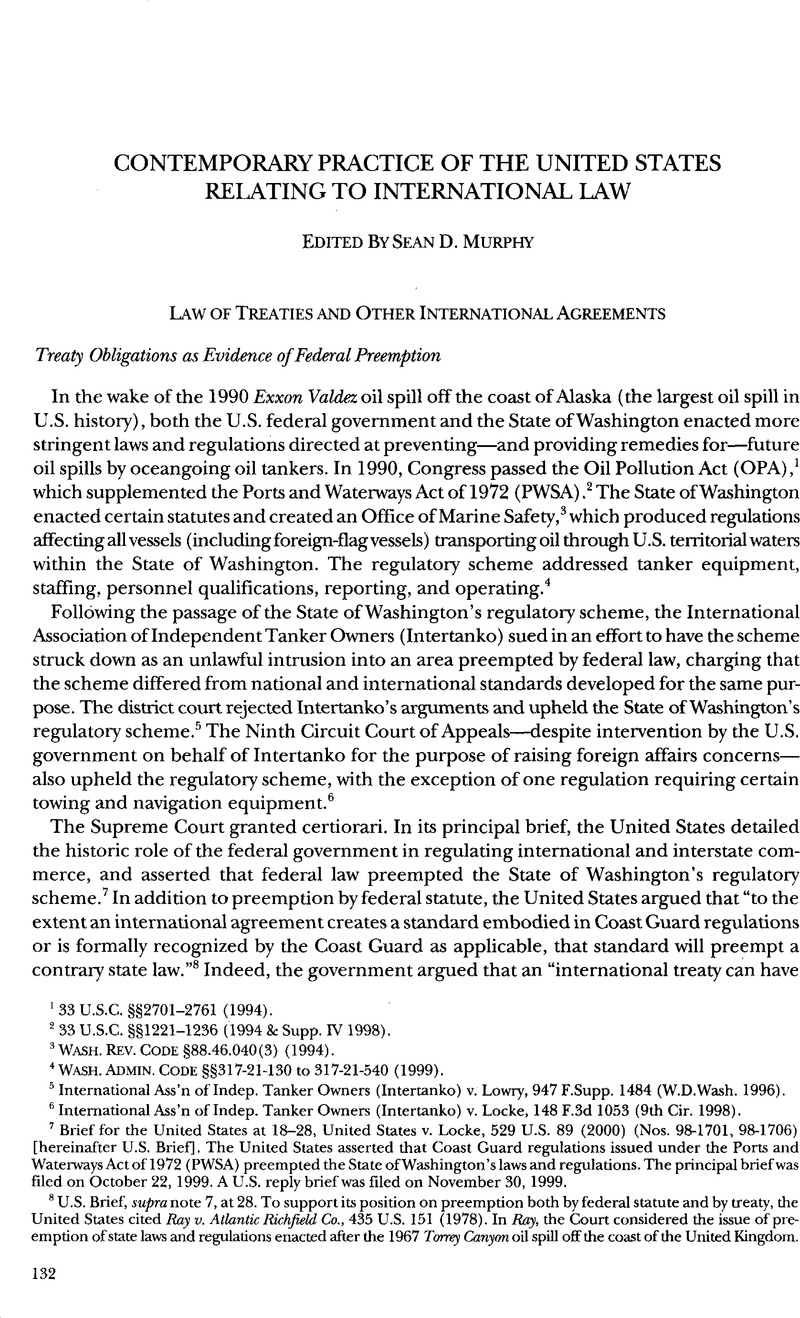No CrossRef data available.
Published online by Cambridge University Press: 30 March 2017

1 33 U.S.C. §§2701-2761 (1994).
2 33 U.S.C. §§1221-1236 (1994 & Supp. IV 1998).
3 Wash. Rev. Code §88.46.040(3) (1994).
4 Wash. Admin. Code §§317-21-130 to 317-21-540 (1999).
5 International Ass’n of Indep. Tanker Owners (Intertanko) v. Lowry, 947 F. Supp. 1484 (W.D. Wash. 1996).
6 International Ass’n of Indep. Tanker Owners (Intertanko) v. Locke, 148 F.3d 1053 (9th Cir. 1998).
7 Brief for the United States at 18-28, United States v. Locke, 529 U.S. 89 (2000) (Nos. 98-1701, 98-1706) [hereinafter U.S. Brief]. The United States asserted that Coast Guard regulations issued under the Ports and Waterways Act of 1972 (PWSA) preempted the State of Washington’s laws and regulations. The principal brief was filed on October 22, 1999. A U.S. reply brief was filed on November 30, 1999.
8 U.S. Brief, supra note 7, at 28. To support its position on preemption both by federal statute and by treaty, the United States cited Ray v. Atlantic Richfield Co., 435 U.S. 151 (1978). In Ray, the Court considered the issue of preemption of state laws and regulations enacted after the 1967 Torrey Canyon oil spill off the coast of the United Kingdom.
9 U.S. Brief, supra note 7, at 28.
10 Vienna Convention on the Law of Treaties, May 23, 1969, Arts. 27, 29, 1155 UNTS 331,339, reprinted in 8 ILM 679, 690-91 (1969).
11 U.S. Brief, supra note 7, at 28.
12 Id. at 29-30.
13 Id. at 33-40 & app.
14 United Nations Convention on the Law of the Sea, opened for signature Dec. 10, 1982,1833 UNTS 397, reprinted in 21 ILM 1261 (1982).
15 International Convention on Standards of Training, Certification and Watchkeeping for Seafarers, July 7, 1978, S. Exec. Doc. EE, 96-1 (1980), 1361 UNTS 190 [hereinafter STCW Convention], The government argued that the State of Washington statutes and regulations imposed requirements that were either more stringent than, or conflicted with, those of the STCW Convention with regard to drug and alcohol testing and reporting, crew-training policies, language-proficiency requirements, operating procedures for restricted visibility, and emergency procedures.
16 International Management Code for the Safe Operation of Ships and for Pollution Prevention, IMO Res. A/741 (18) (1993), obtainable from <http://www.uscg.mil/hq/g-m/psc/miscpages/ismpg.htm>.
17 International Convention for the Safety of Life at Sea, Nov. 1,1974, 32 UST 5577, 1184 UNTS 278.
18 International Convention for the Prevention of Pollution from Ships, Nov. 2, 1973, 12 ILM 1319 (1973), as amended Feb. 17, 1978, S. Exec. Doc. E, 95-1 (1978), 1340 UNTS 184.
19 See U.S. Brief, supra note 7, at 47. The government supported this contention by noting it had received diplomatic notes from Canada and from thirteen other nations and the Commission of the European Communities expressing concerns about differing regimes within the United States. Id. Further, on October 22, 1999, fourteen nations submitted to the Supreme Court a combined amicus brief that argued against upholding the Washington regulatory scheme. See Brief for the Governments of Belgium, Denmark, Finland, France, Germany, Greece, Italy Japan, The Netherlands, Norway, Portugal, Spain, Sweden, and the United Kingdom as Amici Curiae in Support of Petitioners, United States v. Locke, 529 U.S. 89 (2000) (Nos. 98-1701, 98-1706).
20 U.S. Brief, supra note 7, at 49-50.
21 See United States v. Locke, 529 U.S. 89,112-16 (2000). For a more detailed discussion of the Supreme Court’s decision, see Patrick O. Gudridge, Case Report: United States v. Locke, 94 AJIL 745 (2000).
22 United States v. Locke, 529 U.S. at 103.